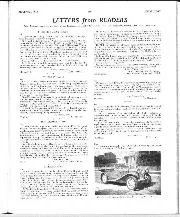
Letters from readers, cont-2., November 1960
OUR EXPORT TRADE Sir, I note that the imports of foreign cars drop off in the United States; the one exception being the VW. As an owner of this machine and, quietly, previously the…
The Racing Car of the Future.
Sir,—First I must congratulate you on your very excellent article on the above subject.
Secondly, I thought that possibly my views as producer of one of the fastest production cars in this country, might be of interest.
There is so much controversy as to whether or not superchargers are going to be used on ordinary touring cars of the future that surely the success or otherwise of blown and unblown cars, competing on a fair basis, between each other in Grand Prix races should decide the question.
Obviously if engine size is fixed the blown car would inevitably win, therefore engine size should be left open. The question now is how to bring the maximum speed of Grand Prix cars down to a safe limit while yet leaving the engine size unlimited. Surely the deciding factor must be fuel consumption. Then we might have a big uriblown engine running neck to neck with a small supercharged engine, and everyone waiting breathless. to see which would last longest before running out of petrol I
The question of refuelling during the race would be so difficult to check that no refuelling should be allowed at all. The cars would have to have big enough tanks to last the existing length of 500 kilometers, or the distance of the race should be slightly shortened.
One further point, various suggestions have been made as to the maximum or minimum weight limit. The point of Grand Prix races is to improve the touring car of the future Certainly a minimum weight limit will not encourage skilful means of weight reduction.
The English are at present very backward in this respect, and it would be a good thing if we learnt by racing experience to make much lighter touring cars.
Presumably, therefore, the best designed car in every respect, whether blown or unblown, would win a race run on these lines, and much would be learnt by the exponents of both supercharged and unsupercharged engines. Yours etc.,
A. M. SQUIRE.
Henley-on-Thames.